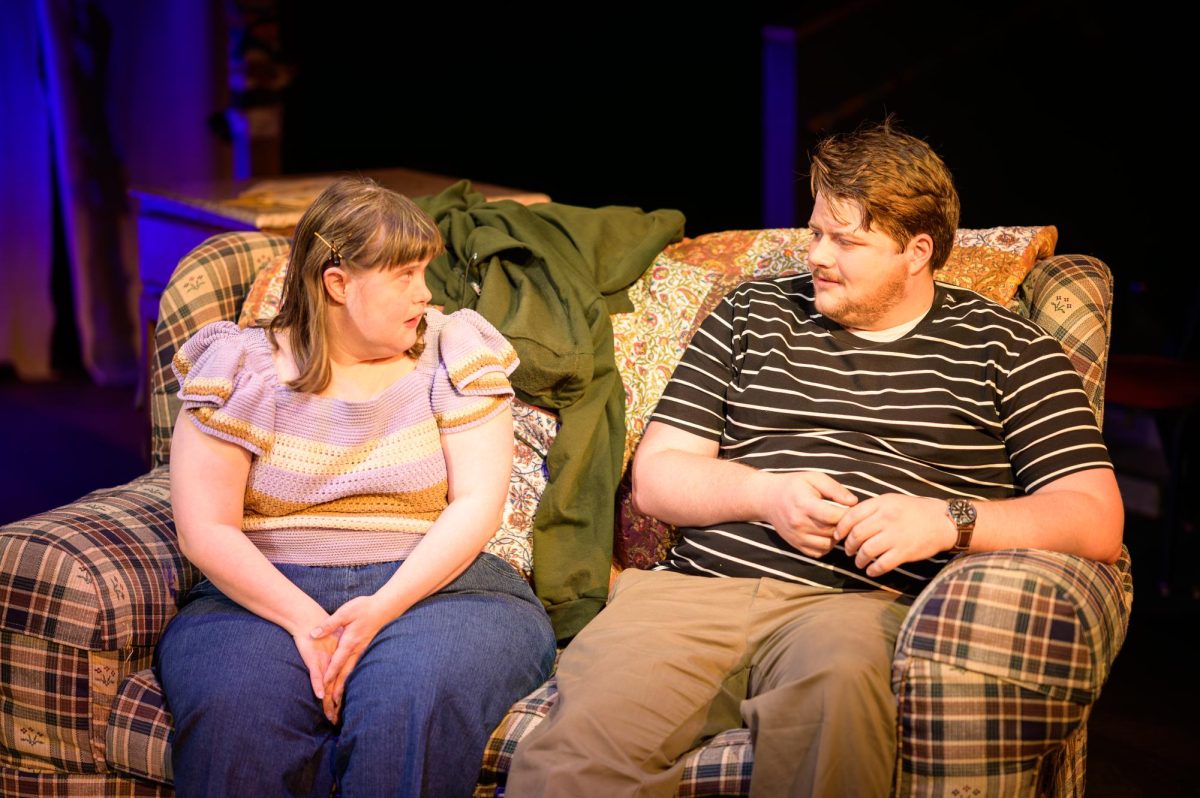The Henry Heymann Theatre came alive Nov. 10 as students, friends and family members filed into the small theater at the foot of the Cathedral of Learning. The crisp turning of program pages permeated the audience’s whispers of anticipation. Textiles in a myriad of colors and patterns wrapped almost every surface of the set.
The Pitt Stages production “Corsicana” runs from Friday, Nov. 10, to Friday, Nov. 17. Written by Pulitzer Prize finalist Will Arbery, Corsicana has a small cast of only four characters, but it tackles large concepts like disability, grief, self-ridicule and family with intimacy and intention. Named after the small city in Texas where it takes place, Corsicana follows Ginny, a woman with Down syndrome, her half-brother Christopher, their close friend Justice and the solitary artist Lot.
Alison Mahoney, director and a Pitt second-year doctoral candidate in theater and performance studies, said the play is not focused on one specific diagnosis, but on the dynamicity of disability and caring for each other.
“It’s a play that is really interested in who is disabled, and what we name as disability, and why and when does that matter,” Mahoney said. “I don’t think it is about any one specific diagnosis. I think it is about how we care, [which] is something that has to be flexible and dynamic and always shifting.”
Mahoney said she wanted to translate the play’s theme of caring into off-stage accessibility.
“The play’s emphasis on care and caring for one another for me was something that I really wanted to bring to the audience as well,” Mahoney said.
Mahoney was the driving force behind the effort to make Corsicana accessible through the implementation of open captioning on all three sides of the stage, American Sign Language interpretation, live audio description, a quiet space in the lobby, supplies to help with sensory processing, relaxed performances and one mask-required performance. Mahoney said actualizing this level of access was no small task.
“This play is a lot of firsts for [the] Pitt Theatre Department, and so there’s a lot about that that’s very exciting, and there’s a lot about that that’s very challenging,” Mahoney said. “It’s hard to find the funding for things that we don’t normally need to find funding for, it’s hard to make sure that everybody’s on the same page if they’ve never done this kind of work before, [and] it’s hard to figure out how to succinctly pitch work like this when so much of its unfamiliar to people.”
On opening night, the open captions were sometimes misaligned with the dialogue, but that didn’t lessen its efficacy or disrupt the comedic timing. The audience responded to every quip and sarcastic response with tremendous laughter and heartfelt applause.
Mahoney also said she encountered spatial challenges when she worked with scenic designer Gianni Downs to add four wheelchair accessible seats to the Heymann Theatre.
“There are the two [wheelchair locations] that are built into the front row of the audience, and then we are adding wheelchair seating on the two sides as well. I wish we could offer accessible seating options in every row of the theater, but the way that the theater is set up the only spaces that are accessible are in the very front row,” Mahoney said. “Making change in any sort of institution is difficult, and there are the attitudes that need to change, but it’s also just the physical structure of spaces that we work up against and try to figure out however we can.”
Several cast members felt the greatest challenge stemmed from the particularity of Arbery’s script. Joshua Reed, a Pitt senior theater major who plays Christopher in Corsicana, said the nuance of the writing made finding the emotions easy but memorizing the lines difficult.
“The lines are phenomenal, and it’s such a well-written play that you want to get them right, but a lot of them are very particular,” Reed said. “It’s written well enough that the emotions come naturally, but at the same time there’s a lot of words to memorize!”
Victoria Murphy, a Pitt sophomore theater arts and political science major, said going easy on herself and everyone else was something she learned to do throughout the play.
“Just giving everyone some grace including myself is the thing with this production that I’ve learned as we go along,” Murphy said. “You just have to roll with the punches a little bit.”
Megan Michaels, an actor with the Center For Theater Arts in Mt. Lebanon, plays Ginny in the play. Like Ginny, Megan has Down syndrome, and she said she wants the play to change how people perceive her.
“I want people to know that I can be as normal as they are,” Michaels said. “Don’t see the disabled side, treat me like you treat your own.”
As for accessibility in future Pitt Stages productions, Mahoney said she hopes the work they did on Corsicana endures, at least to some degree, with support from the audience and theater department.
“My hope is that we build, or start to build, an audience who continues to come to shows because we continue to provide them with access,” Mahoney said. “There’s only so much I can sort of green light in terms of what gets funded and what gets made in the future, but I do have hopes that there are some people in the department who are really energized by what we are doing and want to continue this work.”



